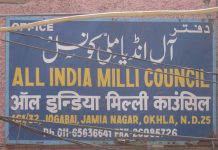A bench of Justices BV Nagarathna and Ujjal Bhuyan today concluded hearing arguments of the convicts in the batch of pleas challenging the premature release of 11 men who had gang-raped Bilkis Bano and brutally massacred her family members during the 2002 Gujarat carnage.
Bilkis Bano has filed a petition Supreme Court against the remission of sentences and the release of convicts in the 2002 gang rape case. The 11 men were sentenced to life imprisonment for raping her and murdering her family members.
Bilkis Bano was 21 years old and five months pregnant when she was gang-raped while fleeing with her family the horror of the anti-muslim riots that broke out in the aftermath of Godhra train-burning incident. Her three-year-old daughter was smashed with a rock to death along with her seven family members were also brutally killed.
The Supreme Court on Wednesday questioned whether the right of a convict to seek remission of his sentence of imprisonment fell under any of the fundamental rights in the Constitution [Bilkis Yakub Rasool v. Union of India and ors].
The Court posed the question while hearing the petitions challenging the early release of convicts in the Bilkis Bano gang rape case.
A bench of Justices BV Nagarathna and Ujjal Bhuyan today questioned whether an Article 32 petition (filed for the enforcement of fundamental rights) could be filed by convicts seeking remission.
Article 32 of the Constitution deals with citizens’ right to move the Supreme Court directly if they feel that their fundamental rights are infringed.
Senior Advocate V Chitambaresh, appearing for a convict, argued that only Article 226 petitions (which have to be filed before High Courts) are maintainable to challenge the grant or rejection of remission.
As per the Article 226 of the Constitution, the high court has powers to issue orders or writs including habeas corpus…, to any person or any government for the enforcement of fundamental rights and for other purposes.
“Who is to say that remission has been granted after following the rules?” the bench wondered.
“It is available only for convicts whose fundamental rights are affected,” he added.
Justice Bhuyan then asked,
“Would a 32 petition (by a convict) lie? Is the right to seek remission a fundamental right?”
Chitambaresh replied by saying it would not lie since seeking remission is not a fundamental right.
He further asserted that such a petition could not be filed by the petitioners who have challenged the grant of remission as well, since their fundamental rights have not been breached.
The Gujarat government had granted remission to the 11 convicts in this case following a May 2022 judgment of the apex court, which came on an Article 32 plea moved by one of the convicts, Radhyesham.
A batch of petitions before the Supreme Court challenged the grant of remission to convicts in Bilkis Bano case in August, 2022. Besides the petition filed by Bilkis Bano, Trinamool Congress (TMC) MP Mahua Moitra, former MP and CPI(M) leader Subhashini Ali, independent journalist R Laul, and former VC of Lucknow university RK Verma also filed please against the decision.
The hearing in the matter will continue on October 4 at 2 pm. The verdict is likely to be reserved after hearing rejoinder submissions by the petitioners.

















